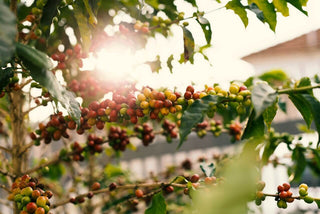How sustainable is coffee? Why should we care at all if our coffee is sustainable? Finally, how to recognize a product that was made with sustainable practices at the forefront?
These questions, and more, will be answered in our newest article!
Key Highlights
- Sustainable coffee considers both environmental and social impact throughout the production process.
- Challenges to sustainability include climate change, deforestation, and unfair treatment of coffee farmers.
- Substantial benefits of sustainable coffee are improved bean quality, healthier ecosystems, and fairer treatment of farmers.
What Is Sustainable Coffee
Sustainable coffee is coffee that is grown and produced in a way that takes into account the environmental and social impact of coffee production. Simple as that.
But, as you can imagine, it’s not simple at all.
Coffee production is a complex issue. The volatile coffee market, climate change effects, and growing demand for coffee products in markets such as China and India are all pressing problems. They may impact the sustainability of coffee production both in the short and long term perspective.[1]

So How Sustainable Is Coffee Production?
With the industry’s environmental impact, and climate change shifts, coffee production has become increasingly less sustainable. Deforestation, for one, releases carbon stored in the trees into the atmosphere, which worsens the problem of global warming.
In turn, climate change makes it more difficult to grow coffee in areas located at lower altitudes. Farmers look to expand their farms in new territories or shut down production altogether, switching to more temperature-resistant crops.[1]
This is only one of the ways in which coffee production can be regarded as unsustainable. And that is also why we see more and more initiatives to counteract that!
There are a number of different practices that can be used to produce sustainable coffee. You can read up on how we at Angelino’s Coffee approach coffee production based on our most important values – family and quality.
But before diving deeper, let’s answer one crucial question – why should we care about coffee sustainability?
Why Sustainability Matters?
As big coffee lovers and brand creators, we know exactly how crucial it is to support local communities and prioritize the quality of the coffee products we’re crafting. Angelino’s Coffee is a family business, so sustainability practices are the result of our passion for the coffee itself and all the other families that are tied to its production.
Why should you care about where your coffee comes from?
Environmental Impact
Coffee production can have a negative impact on the environment if not done sustainably. Conventional practices often involve heavy use of pesticides and fertilizers, which can pollute water sources and harm soil health.
Clear-cutting forests for sun-grown coffee plantations destroys habitats and reduces biodiversity. Unsustainable practices exacerbate global warming, a problem that impacts the whole globe and endangers many populations.
Social Impact
Another crucial piece of the puzzle – coffee farmers, particularly in developing countries, are often vulnerable to low prices and unfair labor practices. Sustainable certifications like Fair Trade ensure farmers are paid a fair price for their beans and work in safe conditions. This improves the livelihoods of coffee-growing communities.
Coffee Quality
Of course, it’s also important to mention that we, as coffee consumers, directly benefit from sustainable coffee production practices. Some studies suggest that sustainable practices can actually improve coffee quality.[2]
For example, shade-grown coffee beans mature slower, leading to denser beans with more complex flavors.[3]
All of this goes to show that sustainable coffee production is the only real way to keep the coffee industry healthy and minimize its harmful impact on local communities, farmers, and consumers.

Sustainable Coffee Production
What are some of the most prominent sustainability actions and practices? How to recognize if your coffee was made in accordance with them?
Organic
Organic coffee is a great choice if you care about sustainable coffee purchases. The whole premise of this type of production is to exclude harmful chemicals and practices from the production process, resulting in coffee that is made with natural techniques and with respect for the environment.
You won’t find any synthetic pesticides or fertilizers used in the production of this coffee. While more expensive, organic coffee is a fantastic alternative if you’re looking for ways to be more environmentally conscious.
Shade-Grown
Shade-grown coffee is coffee that is grown under the canopy of trees. This method helps to conserve forests, providing habitat for diverse plant and animal species. By choosing this coffee, you support rebuilding the natural habitats of birds, which is a pretty cool added bonus to your morning cup of joe.

Sustainability in Coffee – Final Remarks
At Angelino's Coffee, we're passionate about delivering delicious, high-quality coffee that's good for you and the planet. We source our beans from farms that prioritize sustainable practices, ensuring a rich, flavorful cup that supports ethical and eco-conscious growing methods.
From our classic coffee blends to our supreme organic tea selections, Angelino's Coffee offers a variety of options to satisfy your taste buds while making a positive difference. Explore our selection and order your first bundle today!
Sources:
- Vander Velde, Bruno. “What on Earth Is “Sustainable” Coffee?” Conservation International, 29 Sept. 2016, www.conservation.org/blog/what-on-earth-is-sustainable-coffee.
- Martínez, Herminia, et al. “Agronomic Practices toward Coffee Sustainability. A Review.” Scientia Agricola, vol. 81, 1 Jan. 2024, https://doi.org/10.1590/1678-992x-2022-0277. Accessed 5 Nov. 2023.
- Redden, Claire. “What Are Shade-Grown Coffee Beans and Are They Sustainable?” Tasting Table, 24 Feb. 2023, www.tastingtable.com/1209732/what-are-shade-grown-coffee-beans-and-are-they-sustainable/. Accessed 17 Apr. 2024.



